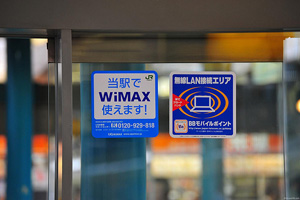Mobile broadband is killing free Wi-Fi

After spending two weeks in Japan scrounging for free Wi-Fi, I've come to the conclusion that mobile broadband is killing free Wi-Fi.

WiMax and BB Mobilepoint were the most common connections available in Japan (WiMax Japan image by Shibuya246, CC BY-ND 2.0)
In seeking to avoid monster costs for global roaming while I was abroad, I disabled that feature on my phone before I left, meaning I was entirely reliant on Wi-Fi to get in contact with friends and family back home.
In Australia, free Wi-Fi is generally available at stores like McDonald's and Starbucks, as well as the ever-reliable Apple. Apart from using my iPad (which is the Wi-Fi model), I have little use for free Wi-Fi within this country because my 3G download quota with Optus for my iPhone is generally sufficient for all my internet needs, so I had not paid too much attention to what was available.
But prior to departing for my trip earlier this month, I thought I should research what internet facilities were available. It was a bleak view to say the least, but I was optimistic because my accommodation provided free internet and the Apple stores were a last resort, so it would all be good.
When I landed in Japan, I found that McDonald's and Starbucks generally didn't have any free Wi-Fi and the stores that did offer Wi-Fi often opted for paid services. The most common I found was BB Mobilepoint, a consortium of telcos that offers connections through hotspots mostly at train stations around Tokyo.
Handy for locals, sure, but not so much for tourists. In Australia, Telstra has a similar program in place with its hotspots.
When I was visiting the sights in Akihabara, the "electric town" in Tokyo that boasts dozens of stores with all the computer and high-tech gear you could ask for, I discovered that most of these stores sold WiMax broadband dongles and it was clear looking at the signs around town that most internet access would be through those.
When I did find places with Wi-Fi (the Wired cafes in Ueno and Shibuya, for example), I would often spend at least an hour or so there, and have a full meal at the same time, so I agree with Darren Greenwood that it is a smart business decision for stores to make the investment in free Wi-Fi.
I could only come to the conclusion that because most of the locals in Japan had existing mobile internet accounts, free Wi-Fi was less of a pressing issue for them, so it wasn't as worthwhile for more businesses to offer free Wi-Fi to its customers. 3G killed the free Wi-Fi star.
After my experience in Japan, I could only think of how it would affect tourists visiting Australia, and I think it would be great to see our telcos team up to offer Wi-Fi services in areas where their 3G networks are lagging, and also invest in offering a free (or cheap) alternative for tourists who lack the ability to access it.
Or the telcos could look at reducing the incredibly outrageous global roaming costs, so we wouldn't need to scrounge for free Wi-Fi. But somehow, I still think that's a long way off.